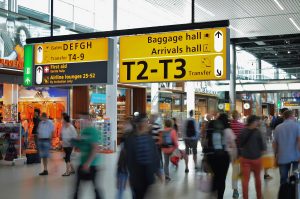
Am I eligible for compensation if my flight was paid for by my employer
Endless delays; abrupt cancellations; lost luggage. These inconveniences often travel on board without invitation, sowing frustration and uncertainty among those who travel for work. But what happens when your seat on the plane has been booked not by you, but by your employer? Are you then still entitled to claim compensation for the inconveniences suffered?
State of play:
Situation | Eligibility for compensation | Amount / Type of compensation | Conditions / Important Notes |
Employer-paid ticket (domestic or international) | ✅ Yes | According to the RPPA or Montreal Convention scale (up to $1,000 or more depending on the circumstances) | The rights belong to the passenger, regardless of who paid for the ticket. |
Delayed/cancelled flight under the control of the company | ✅ Yes | Large companies: $400-1,000; Small companies: reduced amount | Same process as a ticket paid for by the passenger himself. |
Flight delayed/cancelled for reasons beyond your control (weather, force majeure, safety) | ❌ No (monetary) | — | No financial compensation, but free services (meals, accommodation, transport). |
Company with special agreement with the airline | ✅ Yes, but internal management | Variable by agreement | Some compensation may be paid to the company rather than to the employee. Check with RH. |
Claim procedure | Same as a personal ticket | Depending on the deadline (30 days max for response) | Contact the company with documents (ticket, proof of delay); recourse to the OTC in the event of refusal. |
Additional remedies | Companies specialising in claims, travel insurance, bank cards | Variable | Some insurances cover even if the ticket has not been paid for by the passenger. |
International (Montreal Convention) | ✅ Yes | Up to ~$6,000 CAD depending on injury | Applicable to international flights to, from or through Canada, regardless of who paid for the ticket. |
Passenger rights
The Canadian legal framework is clear: no matter who pays for the ticket, the passenger’s rights remain unchanged. When you board a plane, your rights as a consumer of air services are protected by the Canadian Transportation Agency (CTA). This means that even if your employer has taken out their credit card to make the booking, it is you – the traveller – who is eligible for compensation if something goes wrong.
However, there is a catch… Compensation policies vary by airline and may be subject to interpretation. It is therefore crucial to obtain information directly from the company concerned or to consult the CTA to find out exactly what your rights are.
Additionally, some companies have their own policies regarding business travel. It is possible that your employer already has an agreement with the airline or that he or she manages the compensation obtained differently. It is therefore wise to check with your HR department before taking any steps.
Compensation procedure
The procedure for claiming compensation remains relatively standard, although each situation is unique. First: document everything! Keep your boarding passes, receipts and any other forms of proof (e.g., photos of bulletin boards announcing delays). These documents will be your allies when it comes to proving your case.
Then, go directly to the airline to start the claim process. Most carriers have online forms or dedicated numbers for this. Be specific in your requests and patient; These steps can take time.
It is important to remember that if the first response is not satisfactory, you have the right to call the CTA for help. This body can act as an arbitrator between you and the airline to resolve the dispute.
Specific considerations
Sometimes the devil is in the details… If your flight was international, other regulations such as the Montreal Convention may come into play. This international convention states that any passenger who suffers a delay or cancellation is entitled to compensation – regardless of who paid for the ticket.
There are also notable exceptions related to circumstances: if a delay or cancellation is caused by extreme weather conditions or situations beyond the control of the company (“force majeure”), then the eligibility for compensation may be questioned.
Additional remedies
In addition to direct approaches with airlines and the CTA, there are also additional recourses. Some passengers choose to use companies that specialize in air passenger claims – for a commission on the compensation recovered. On the other hand, check to see if your bank card used for the trip offers additional travel insurance that can cover some of the inconveniences of delayed or cancelled flights – even if you didn’t make the original transaction.
Finally, always consult your employment contract as well as any internal policies relating to business travel; They may contain essential information on the procedures to be followed in such a context.
When something goes wrong with a flight paid for by your employer in Canada, keep in mind that your rights as a passenger are not evaporated by the fumes of kerosene. Your eligibility for compensation remains intact; It simply requires that you be informed and proactive in your efforts.


